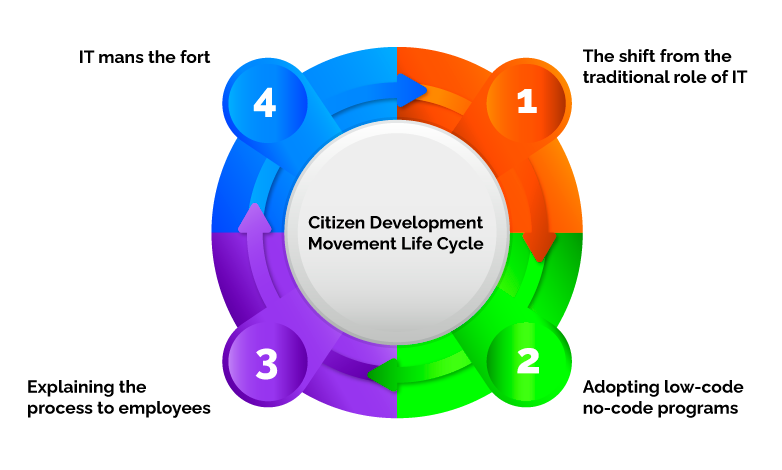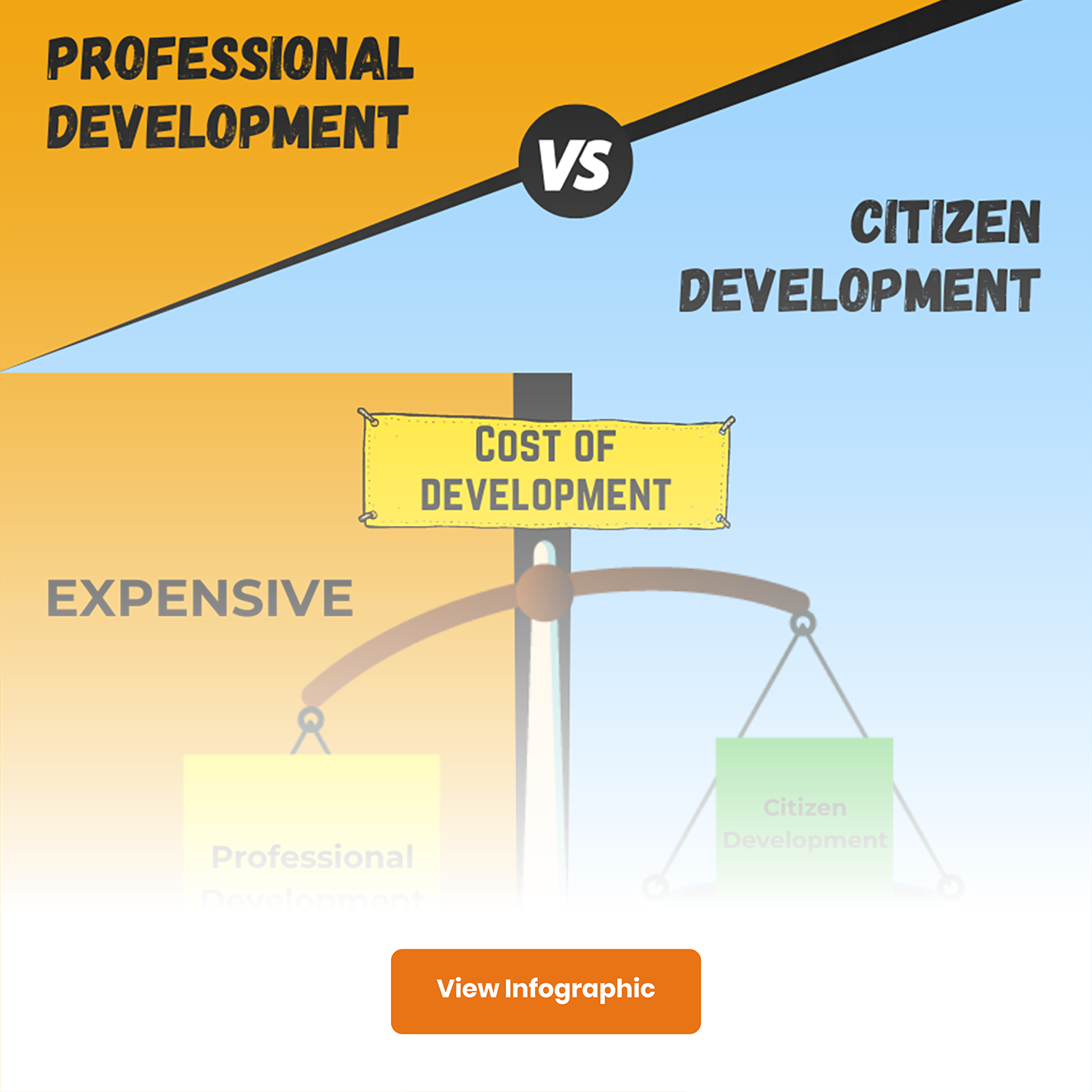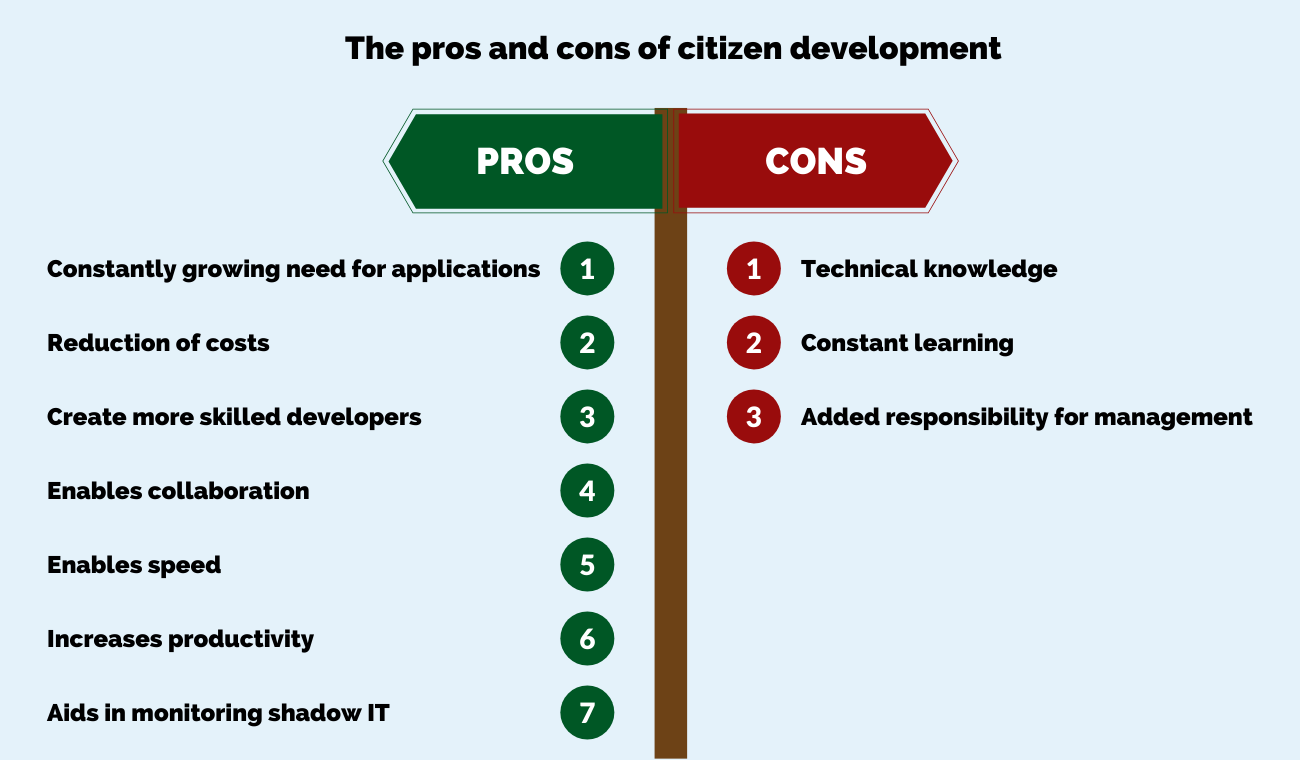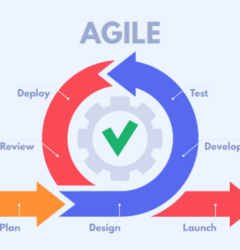
Citizen development has sparked a debate over its effectiveness and usefulness compared to professional development. Citizen development refers to the practice of non-technical professionals using low-code or no-code platforms to create applications that meet their business needs. On the other hand, professional developers have formal training and experience in software development, using traditional programming languages to build complex and scalable applications.
While some argue that professional developers are essential for ensuring the quality and security of software applications, others believe that citizen development can provide more flexibility and agility in addressing business needs. In this article, we will explore the benefits of citizen development and why it may be a viable option for organizations looking to build applications quickly and efficiently.
Are you curious about the differences between citizen developers and professional developers? Let’s explore their unique roles and skills in software development.
Citizen Developer vs. Professional Developer: Who Will Lead the Future of App Development?
We’ll explore the strengths and weaknesses of citizen developers and professional developers and how organizations can leverage both to create innovative applications that meet their business needs.
Who are Professional Developers?
First up, we have professional developers – coding wizards who have the knowledge and expertise to create, maintain, and upgrade software for commercial purposes. They’re typically employed to use their coding skills to develop complex and scalable applications.
Who are Citizen Developers?
When it comes to the definition of citizen developers, they are the rising stars who are taking the tech industry by storm. These individuals have little to no coding knowledge and work outside the IT department, yet they possess the ability to create custom applications for themselves, fellow employees, and even customers. They leverage low-code/no-code platforms with visual interfaces and drag-and-drop builders to connect components and create software without writing code.
It’s no surprise that citizen developers are becoming increasingly popular in large enterprises, with Gartner predicting that they will outnumber professional developers by four to one. In fact, 61% of corporations have already implemented citizen development projects or plan to do so.
IT Backlog Crisis: The Rise of Citizen Development as a Solution
The question of a citizen developer vs. a professional developer arises due to the current IT backlog.
Numerous IT solution requests have not been able to be built as the conundrum of IT is that it needs to not only create applications but also maintain and upgrade the ones they have already created, and with the fast pace at which the business environment functions, IT cannot possibly do it all, all alone.
Now, according to a recent Gartner report, 61% of companies already have or are planning to have initiatives for citizen development. You can also check out Citizen Developer’s Toolbox: Insights and Strategies from Our eBook-Innovate and Empower: A Journey through Citizen Development!
Also read: The Rise of the Citizen Developer and why should every business care?
According to a recent Gartner report, 61% of companies already have or are planning to have initiatives for citizen development.
Difference Between Citizen Developers & Professional Developers
Here’s a comparison table for Citizen Developer vs. Professional Developer:
| Citizen Developer | Professional Developer |
|---|---|
| No formal training in software development | Formal training in software development |
| Use low-code or no-code platforms to create applications | Use traditional programming languages to build applications |
| Focus on addressing specific business needs | Focus on creating complex and scalable applications |
| Work outside the IT department | Work within the IT department |
| Limited understanding of software architecture and security | Strong understanding of software architecture and security |
| Able to create applications quickly and efficiently | May take longer to develop and deploy applications |
| More agile and flexible in responding to changing business needs | May be more rigid in following development processes and standards |
| Can create simple to moderately complex applications | Can create complex and highly scalable applications |
| Limited ability to troubleshoot technical issues | Able to troubleshoot technical issues more effectively |
| Requires little to no coding knowledge | Requires advanced coding knowledge and experience |
This table provides a brief overview of the main differences between citizen developers and professional developers in terms of their skills, training, focus, and approach to software development. It’s important to note that both types of developers have their own unique strengths and weaknesses, and that organizations can leverage both to create successful applications that meet their business needs.
Also read: 5 Reasons to Encourage Citizen Development at Work
Benefits of low-code no-code platforms
- Operations costs are lowered in the long run after the initial investment and occasional maintenance expenses.
- Time taken to complete tasks is saved with these platforms, which enable employees to spend their time in other areas furthering the organization’s operations and aiding its growth.
- The company’s operational efficiency is increased due to higher productivity, greater agility, and speed for the organization.
Citizen development is usually a concept explored by companies with business lines that have no coding experience. The citizen developer acts as the problem solver by providing this efficiency in lesser time and cost.

Also read: Top 10 Benefits of No-Code App Development
Citizen Development Life Cycle
People were highly dependent on IT for better functionality or working. The employees expected IT to consistently create applications and keep their functioning smooth, along with new features, upgrades, etc.
Putting such a heavy responsibility on one department is impossible for them to achieve the rapid changes in the daily business environment and the ever-changing needs of customers and employees.
This led to the citizen development movement, whose life cycle has been explained below:

1. The shift from the traditional role of IT
IT was moved into a different role wherein their traditional role is converted into infrastructure building so that the relevant tools and data can be provided to the employees, who then leverage those components to find solutions to their business’ particular issues.
2. Adopting low-code no-code programs
The crux of the movement is the leveraging of low-code, no-code platforms to create easier solutions for companies. 80 percent of companies are moving to these platforms for application creation. This has become a trend and is booming because its usability encourages citizen developers to easily solve market issues.
3. Explaining the process to employees
Any person who gains an understanding of these tools can work in the development of applications for the business and become a citizen developer. In the argument of citizen developers vs. professional developers, ease is a big plus point in favor of citizen developers.
4. IT mans the fort
IT is still required in the citizen development movement as an over-viewer to ascertain the risky factors in integrations and permissions; without them, citizen developers cannot create, maintain or upgrade solutions.
An organization could follow three possible dynamics:
- IT creates the applications, and the company uses them for business practices.
- IT focuses on the critical creation and strategic aspects of the process, while the citizen developer uses the components given to create business applications.
- IT and the citizen developer collaborate in building the application and oversees the project’s work.
While the movement for citizen development is going strong in the citizen developer vs. professional developer concept, there are various downsides to it as well.


The Pros and Cons of Citizen Development
It is important to keep in mind that there are always two sides to a coin, and like any other concept, this also has its benefits and flaws.
Let’s explore the various pros and cons of Citizen Development.

Pros:
1. Citizen development can boost IT
Microsoft anticipates that the 500 million apps it expects will be created over the next five years, 450 million will be designed on no-code low-code platforms. Companies require applications to sustain themselves and their revenue earnings. IT cannot fulfill this need alone due to resources being limited. Citizen developers can help solve this.
2. Reduction of costs
The costs will be reduced as the organization will not need to employ professional developers with expertise in building these applications. In the question of citizen developers vs. professional developers, citizen developers have been seen to reduce costs over time and add more value to the company.
3. Create more skilled developers
There is a shortage of professional developers with in-depth knowledge of the market; this limited pool of developers puts pressure on IT. Citizen development creates a wider understanding of technical application building within the staff to aid the digital transformation of the business and further its growth and development.
4. Enables collaboration
There is better internal and external department collaboration, which facilitates an improvement in the organization’s agility. This is because it allows the concept of citizen developers vs. professional developers to become citizen developers working with professional developers.
5. Enables speed
Speed is imperative to the functioning of an organization. A company’s fast pace can lead to the success of its operations.
Also read: Big vs. Fast Companies
Low-code no-code helps a business build applications faster using previously built templates.
6. Increases productivity
The organization’s productivity increases as it becomes more flexible with IT. Citizen development reduces the IT backlog and enables it to focus on more critical issues that are more complex to understand, such as enterprise-wide applications, core system extensions, and legacy modernization.
7. Aids in monitoring shadow IT
Over the past 5 years, shadow IT has increased considerably. when it is left unsupervised, it can become a mess. citizen development can aid IT as a program that can be monitored with IT being given the control and visibility they require to govern the security and quality of the applications.
Cons:
1. Technical knowledge
Citizen developers require a certain extent of technical knowledge; not all employees are tech-savvy. This can be a bottleneck in the smooth functioning of the organization.
2. Constant learning
Since technology in the business environment is moving at such a fast pace, in order to keep up with it, IT has to ensure that applications and programs for consumption by internal and external stakeholders are accordingly updated, and new ones are created. The employees will have to be consistently informed and trained with this software as and when they upgrade.
3. Added responsibility for the management
For the new learnings to be conveyed to the employees, management will have to thoroughly understand the applications created and their consequent upgrades; additionally, lessons will have to be built by management about the platforms to relay the same learnings to the staff.
Also Read: Top 55+ No-Code Low-Code Citizen Development Statistics, Facts, and Trends you cannot miss
Conclusion
It is very important to understand the pros and cons of citizen development. It is evident that the pros outweigh the cons, and in the question of citizen developers vs. professional developers, citizen development seems like the way to go for a better future for the company. The movement in its name is succeeding and will continue to innovate in the coming years.
The IT backlog and monitoring of shadow IT can be done with widespread citizen developers in an organization to reduce the load off of IT and further digital transformation. Low-code, no-code platforms are essential for citizen developers to be able to create applications.
Quixy is a no-code platform that companies can leverage for this use. Based on the benefits mentioned earlier, Get Started Today! Empower your organization with automation and customized app development without coding.
Frequently Asked Questions
This section aims to answer some of the most common questions related to the differences between professional developers and citizen developers.
Q. What is a no-code platform?
A no-code software development platform allows users to create and deploy applications without writing any code. These platforms typically use visual interfaces and pre-built modules to make application development more accessible to non-technical users.
Q. Can professional developers use a no-code platform?
Professional developers can use a no-code platform to create and deploy applications. No-code platforms can be a useful tool for professional developers to create simple applications quickly, allowing them to focus on more complex projects that require programming skills.
Q. What are the advantages of using a no-code platform for citizen developers?
Using a no-code platform can enable citizen developers to create and deploy applications quickly & efficiently without relying on traditional IT departments. It can also help reduce costs & improve ROI associated with software development and improve collaboration between business users and IT departments.
Q. Can Citizen developers ease the load of professional developers? How?
Citizen developers can ease the load of professional developers in several ways:
Tackling low-code projects: Citizen developers can take on low-code projects, such as building simple web applications or automating repetitive tasks, that don’t require a deep understanding of programming languages or complex software engineering principles. This frees up professional developers to focus on more complex, high-value projects.
Citizen developers can help alleviate some of the workload on professional developers by taking on simpler projects and tasks, freeing up the professionals to focus on more complex and high-value work. Also, citizen developers can help with user testing and bring new ideas to the table, potentially improving the overall quality of the final product.
Q. Why Have Citizen Developers Become Popular?
Citizen developers have become popular because they represent a paradigm shift in app development, democratizing the process and empowering non-technical users to create custom applications quickly and easily. By removing the need for specialized development skills and lowering costs, citizen development has opened up new opportunities for innovation and collaboration within organizations. So if you’re looking for a faster, easier way to develop applications, it’s no wonder that citizen developers have become a popular choice!
Q. What are the pros and cons of being a software developer?
Pros of software development include creating custom software solutions tailored to specific business needs and requirements. However, software development can be expensive and time-consuming and requires specialized skills and knowledge.
Cons of software development include high costs, lengthy development times, and a lack of collaboration and innovation. Additionally, traditional software development often requires specialized developers and coding knowledge.
Citizen development can help mitigate these cons by empowering non-technical users to create custom applications quickly and easily, without the need for specialized developers or coding knowledge. By enabling greater collaboration and innovation, citizen development can accelerate app development and reduce costs, making it a popular choice for businesses looking to stay ahead in the digital age.
Q. What are the key skills required for citizen developers, and how can they acquire them?
Who says you need to be a coding whiz to build custom apps? With the rise of no-code and low-code platforms, anyone can become a citizen developer! All you need is a basic understanding of programming concepts, a touch of creativity, and the right resources at your fingertips. So why wait? Empower yourself and your organization with the skills to build custom applications that drive innovation and collaboration – without breaking the bank on professional development.
Q. How does citizen development impact the role of professional developers within organizations?
Citizen developers require a combination of technical and non-technical skills, including understanding and solving business problems, working collaboratively, and learning new tools and technologies quickly. They also need a good understanding of data management, integration, and user experience design.
Citizen development can impact the role of professional developers within organizations by shifting their focus from building routine or basic apps to more complex and strategic ones. This allows professional developers to focus on more high-level tasks, such as architecture, infrastructure, and governance, while citizen developers handle routine development tasks. This can lead to more efficient use of resources and faster delivery of software solutions. However, professional developers still play a critical role in overseeing and supporting citizen development efforts, ensuring the security and compliance of apps built by citizen developers, and providing training and support as needed.
Q. How do organizations without citizen development perform?
Organizations without citizen development often rely on their IT departments or third-party developers to build and maintain digital solutions. While this approach may work for some organizations, it can be time-consuming and costly. It can also create a bottleneck for digital transformation initiatives, as IT departments can become overwhelmed with requests. In contrast, organizations that embrace citizen development can empower their employees to create digital solutions, enabling faster innovation, increased agility, and better collaboration between IT and business teams.
Subscribe
Login
Please login to comment
0 Comments
Oldest















